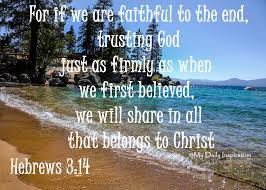Last Sunday, we had a look at the Davidic covenant that in due course would be replaced by the New Covenant. Today, Jeremiah the prophet preannounces this Covenant, while Jesus explains its nature: a covenant of love based on His death on the Cross. It may be noted that the earlier covenants were provisional, of a material nature, and linked to a nation; they were a long preparation for this new, spiritual, eternal and universal Covenant.
That explains the joy with which the otherwise ‘Weeping Prophet’ Jeremiah makes the announcement to the Judeans exiled in Babylon. You will hear him thus in today’s First Reading (31: 31-34): ‘Behold the days are coming, says the Lord, when I will make a new covenant with the house of Israel and the house of Judah…’ This was not a covenant to be engraved on stone, as in the days of old, but upon hearts (which the Jews regarded as the seat of wisdom and willpower).
Would the survivors of the two divided kingdoms honour the covenant? The answer would manifest itself when Jesus came to the world four centuries later. Meanwhile, the cold reception that the Divine Babe received that December night foreshadowed His ministry’s lack of ‘success’ (as the world sees it). But it was not God that failed – He never will – but the Jewish people who had failed their God. Their bad decisions came home to roost. Look at how the Jewish state crashed at the hands of the Romans in 70 AD – a vindication of what Our Lord had foretold. The issue of the Jewish dispersion, persecution and later unification still dogs contemporary world affairs. The problem with the Jews was that they had their eyes set on their country’s freedom and glory; but alas, in their worldliness, they failed to see that mighty sin militated against their lofty wishes.
As for the Son of God, he was precisely targeting the destruction of sin. He did not come to the world to save His country as the people would like it, but to save His people from their greatest enemy – sin. He would even die to destroy sin, but none of that seemed to matter to the political and religious leaders and their hangers-on in Jerusalem. They were all so self-centred, and warped in their doctrine, that their country was their everything. They were convinced that the world would be saved through them alone.

The Scripture, on the other hand, was clear as daylight, yet the Jews failed to see the writing on the wall. Had not Isaiah (56: 6-7) quoted God as follows: ‘the foreigners who join themselves to the Lord […] these I will bring to my holy mountain […] for my house shall be called a house of prayer for all peoples’? This came to pass in today’s Gospel text (Jn 12: 20-33), when Gentiles – Greeks to start with – sought a meeting with Jesus. They first approached Philip, attracted by his Greek name, and Andrew took them all to Jesus. Here is an indication that the Lord would not wait indefinitely for the Jewish people to take the Covenant seriously. His hour had arrived….
The hour had indeed arrived for the Son of Man to be glorified on the Cross. But what glory was there in dying? In the eyes of the world, none! But God’s ways are different from our ways… To get the message across, Our Divine Master employs the analogy of a grain of wheat that falls to the ground and perishes, to bear much fruit. By the same token, when you and I die to ourselves (that is to say, set aside our sinful ways and embrace God’s) we will be born again; he who ‘hates his life in this world’ (loves God more than self) will save himself for eternity. Jesus showed the way by accepting his imminent death – and soon a voice from Heaven endorsed it, saying, ‘I have glorified it [in the river Jordan and at Mount Tabor], and I will glorify it again.’
Now, could the voice from Heaven be Greek to anyone who had ears to listen? The Chosen Race would soon be seen in their true colours. For His part, Our Lord, with loud cries and tears (which attested to His human side) offered up prayers and supplications to His Father who could save Him from death, but at the same, remained obedient and faithful to the end, as we learn from the Second Reading (Heb. 5: 7-9). In this way, Jesus became the source of salvation to all who obey Him and now challenges us to entrust our lives into His hands. He is always faithful; it is we who fail Him… and finally, through our own fault, fail miserably in our endeavours! He longs for us who are made in His image and likeness, but sadly, we wander away.
This Lent, therefore, let us resolve to change our ways, praying: ‘A pure heart create for me, O God!’ (Ps 51: 12) Let us humbly seek His mercy, kindness, compassion. Let us also pray for other transgressors and sinners like us: that we may form a community ever faithful to the Lord our God and be blessed with the joy of His help.
Roadmap to salvation.
Transformative truth..!!!